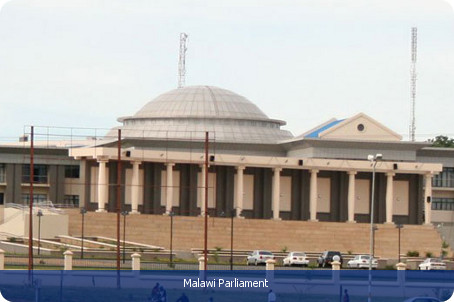Government
- Overview
- History

Malawi is a presidential republic, and since 1994 it has been a multi-party democracy. The president is both head of state and government. Executive power is exercised by the government. Legislative power is vested in both the government and the National Assembly.
Under the 1995 constitution the president is chosen through universal direct suffrage every five years for a maximum of two terms. The vice-president is elected with the president. The president can elect a second vice president who must be from a different party. The cabinet, appointed by the president, can be drawn from within or outside the legislature.
The national assembly has 193 members elected for a five-year term in single-seat constituencies. Although the constitution of 1995 provided for a senate of 80 seats, a constitutional amendment approved by the National Assembly in 2001 removed the provision for a senate. Thus, the legislature in Malawi remains unicameral.
Local government is carried out in 28 districts within three regions with administrators and district commissioners who are appointed by the central government.
The 1994 constitution contains a bill of human rights (although it retains the death penalty) and protects the independence of the judiciary from the executive and the legislature. The High Court sits in Blantyre, Lilongwe, Mzuzu and Zomba, and magistrates’ courts are located in cities and towns in 24 districts throughout the country. Appeals from the magistrates’ courts are heard by the High Court and those arising from the High Court by the Supreme Court of Appeal in Blantyre.

Malawi’s name derives from its former name Maravi or ‘reflected light’. The pre-colonial Maravi Empire was a loosely organised society covering an expanse well beyond present-day Malawi, and encompassed first the Chewa and later the Tumbuka ethnic groups.
David Livingstone, the famous Scottish missionary and explorer of Africa, visited Lake Malawi (then called Lake Nyasa) in 1859 and was followed in succeeding decades by British missionaries, traders and planters.
In 1891, Britain declared the country the British Protectorate of Nyasaland. In 1953 the United Kingdom federated Nyasaland with Northern Rhodesia (Zambia) and Southern Rhodesia (Zimbabwe). Many people in Nyasaland were opposed to the federation, and Dr Hastings Banda was invited by the Nyasaland African Congress to lead the fight against it. Internal self-government of Nyasaland was achieved in 1963, the federation was dissolved and Nyasaland (Malawi) achieved full independence in 1964.
Dr Banda, prime minister of newly independent Malawi, became president in 1966 when Malawi became a republic. Banda was leader of the Malawi Congress Party (MCP).
63 per cent of the 78 per cent of Malawi’s adult population who voted on the national referendum in 1993 supported a multiparty system. Constitutional amendments were made accordingly.
Presidential and parliamentary elections were held in 1994. Bakili Muluzi won the presidential election. Although his party, the United Democratic Front (UDF), obtained the largest number of seats in the National Assembly, it did not win enough to constitute an overall majority. Muluzi thus formed a coalition government. A similar outcome, in both the presidential and the parliamentary elections, occurred in the elections of 1999.
In 2002 a narrow majority of parliamentarians voted against an amendment that would have allowed Muluzi to stand for a third term as president. In a close contest in 2004, Dr Bingu Mutharika of the UDF won the presidential election. No one party won an overall majority of seats in the parliamentary elections of that year, although the MCP won the largest number.
In 2005 Mutharika left the UDP to form a new party, the Democratic Progressive Party (DPP). In the 2009 presidential election Mutharika was again victorious, and the ruling DPP won an overall majority in the parliamentary elections.
Mutharika died suddenly in early April 2012. Vice-President Joyce Banda was then sworn in as president. Joyce Banda became Malawi’s first female president and the second woman to lead an African country (Ellen Johnson Sirleaf, who became president of Liberia in 2006, was the first).




